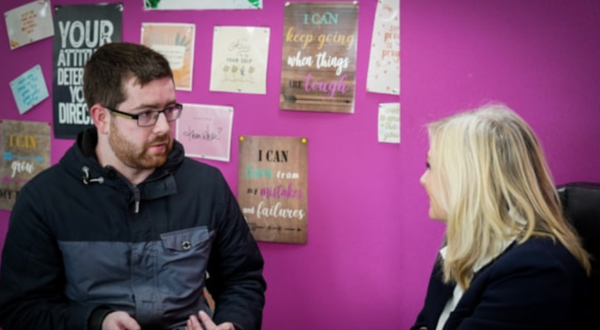Mayor unveils £37m plan to get West Yorkshire working



A new multimillion-pound plan aims to guarantee a healthy working life to everyone in West Yorkshire, through new personalised support for people who are out of work because of a disability or health condition.
The region’s £37 million plan for healthy working life has been co-created with the NHS following consultation with residents and employers. It aims to grow the economy and put more money in people’s pockets by supporting those with sickness or disability into secure, well-paid work.
By bringing health services together with providers of employment support – including job centres, charities, councils and the West Yorkshire Combined Authority – the region’s Mayor and NHS leadership have pledged to deliver the “healthiest residents and workforce in England by 2040”.
They will do this by ending the approach of public services working in isolation from each other, which fails to acknowledge the full needs of a person who is being held back unfairly by a health condition. Instead, by providing a joined-up approach, patients will receive a wrap-around service made possible by devolution. For example, individuals may receive expert employment advice as part of their NHS treatment or care pathway.
Mayor Tracy Brabin said the plan marked a “watershed moment” for West Yorkshire, where the right support would help to ensure that everyone who was able to work, could.
The ambitious regional plan has been made possible by the UK Government’s Plan for Change. This aims to boost living standards and grow the economy by unlocking work for the 2.8 million people who are economically inactive due to long-term sickness, including by funding and devolving services so they can be joined up at a regional level to have a bigger impact.
Tracy Brabin, Mayor of West Yorkshire, said: “We’ve spoken to people across our great region who are living with health conditions, and the answer was clear – too many people feel written off from good health and good work when the right support could transform their lives.
“Today marks a watershed moment for our region. By joining up health, skills and work with a multimillion-pound plan that’s backed by the government, we’ll ensure that everyone can get the personalised support they need to succeed.
“To grow our economy we must unlock the potential of everyone in it, and that includes giving those with health conditions a fair chance to flourish. Through our strong regional partnership, we’ll build a healthier, wealthier West Yorkshire.”
Rob Webster CBE, chief executive of the NHS West Yorkshire Integrated Care Board (ICB), said: “This is good news for people in West Yorkshire and the wider region. We know good work is a route to good health. We also know that there are people in West Yorkshire who are economically inactive due to their health conditions who want to be supported to stay in work or get back into work.
“We have a history of good collaboration in West Yorkshire and will use this resource to show how better, joined up support for people can change lives.”
The launch of the plan follows the selection of Wakefield by the government to be the first place in the country to trial a new, more personalised Jobs and Careers Service for jobseekers.
Under the pilot, the jobcentre will test bold new ideas, including working more closely with local employers to provide clear pathways into good jobs. The reforms are aimed at involving local areas in the design and delivery of welfare services to bring an end to the Whitehall-led, one-size-fits-all approach.
On a visit to Wakefield the Minister for Employment Alison McGovern said the Department for Work and Pensions would move away from a “tick box approach” to jobseekers and toward more personalised support that factored in both personal needs and local job opportunities.
She said: “Our one-size-fits-all, tick box approach to jobs support is outdated and does not serve those looking to better their lives through work.
“We are building a proper public employment service in partnership with local leaders that truly meets community challenges and unlocks opportunity.
“The launch of the Pathfinder in Wakefield is the first step in this transformation as we continue to Get Britain Working, boost living standards and put more money in people’s pockets, under our Plan for Change.”
Cllr Denise Jeffery, leader of Wakefield Council, said: “This plan puts Wakefield at the centre of how we provide better and more personalised support to help jobseekers get back into work.
“Everyone in our area deserves to be supported to access great employment opportunities. But for too long we’ve had an outdated, national approach to employment support which doesn’t take individual circumstances into account and isn’t tailored enough.
“By being part of this Pathfinder, we can help design the next generation of public employment services. Support more local people to access secure, well-paid jobs. And unlock more of the potential we’ve got in our district to build a stronger local economy for everyone who lives in Wakefield.”
In West Yorkshire, there are 100,000 people who are out of work because of a disability or health condition. A consultation of those with lived experience found that in many cases, people wanted to work for the financial security and feelings of purpose and social connection, but felt unfairly excluded from work due to their health or disability.
Similarly, employers who were consulted recognised the need to open up job opportunities by accommodating people with different needs. Examples of good practice included recruiting based on proven skills and capabilities as opposed to traditional interviews, and retaining workers through flexible working hours and workspaces, including phased returns for those returning from long-term sickness.
Such measures are vital for employment and economic growth, with just 3% of those who are out of work for more than a year because of a health condition returning to work.
To address these findings, the Mayor’s £37 million plan to get West Yorkshire working includes five key priorities:
Strengthening the region’s work and health partnership, including through a new oversight ‘Healthy Working Life’ board led by the Mayor and the chief executive of the ICB, tasked with getting more people into work. Public sector reform will be locally-led and embed new ways of working and information sharing across the NHS, the West Yorkshire Combined Authority and employment support providers. This will deliver better, joined-up services for residents, employers and communities, tackling poor health and worklessness.
Tackling the barriers that small and medium-sized businesses face when recruiting and retaining staff with disabilities or health conditions. Support for employers could include financial assistance to create more inclusive workplaces, combined with specialised HR and Occupational Therapy advice and services to ensure that firms are well-equipped to support all employees. Support will also be provided to those who are, or want to be, self-employed.
Designing new incentives to support more people into good work. These incentives could include publicly funded work placements to accelerate a person’s return to work, as well as financial support for employers to offset increased costs such as training. For those with health conditions, they will receive wrap-around support into good quality work, including through direct financial assistance, the development of their employability and “soft” skills such as problem-solving and public speaking, and free training, mentoring and mental health support.
Backing of the Voluntary, Community and Social Enterprise sector to identify and support those who are experiencing poor health and economic inactivity. These services are often the best at reaching people who are the furthest away from the labour market, so they will be bolstered to continue their work engaging with communities and providing wraparound support for people who are out of work or at risk of leaving work, through new funding and partnership working.
Establishing new peer networks of residents, employers and charities to share their experiences, either of being out of work due to a disability or health condition, or of supporting people back into work. Residents, businesses and charities will be able to access learning and training opportunities as part of wider peer networks of people benefitting from shared learning.